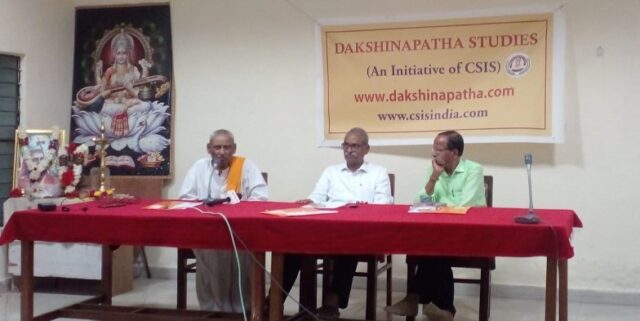
– Prof Mudigonda Sivaprasad
Dakshinapatha Studies, an initiative of CSIS ( Center for South Indian Studies) conducted an important session on the topic of `Agnyatha chaaritraka veerulu/Unsung Heroes- Musunuri Naayakulu’, a talk by Prof Mudigonda Sivaprasad on the evening of 26th March 2023 at Surabharati, OU Campus, Hyderabad.
Prof G. Anjaiah, HoD, History Dept, Osmania University and Prof Gopal Reddy, President CSIS, were on the dias. Sri Ayush Nadimpalli from CSIS welcomed the audience and introduced the work of CSIS Dakshinapatha Studies; CSIS is registered in 2017, the organization is trying to explore the gaps in history, and write about the unsung heroes of various epochs in history. Dakshinapatha Studies is now exploring the post-kakatiyas period, which seems to be a totally forgotten chapter. He said even in the modern period, there were heroes like MahipatRam and others, whose names we are not aware of.
Prof Gopal Reddy, president CSIS in his welcome address stated that history has been heavily distorted after 1966 and Left ecosystem has established it’s stranglehold in the academic arena. Though History Congress conferences are held every year, very little original work was done in the last 75 years. As actual history was ignored and distorted, we need to explore and study the forgotten chapters and unsung heroes during the course of our history. He hoped that under the aegis of CSIS, important work in establishing true history would be accomplished. He welcomed the audience and Prof Mudigonda Sivaprasad. Smt Mahati Vakkalanka introduced Prof G. Anjaiah, head of the dept, History Dept, Osmania University, Prof Anjaiah presided over the evening’s event.
Prof Anjaiah in his talk stated that in the last two years, scholars are involved in exploring and studying the forgotten and ignored chapters of history without any bias. As the social and political awareness grows in the society, young scholars will begin to research and understand the forgotten works of past historians also. He mentioned the work of Prof Sarojini Regani who in the 1960s published a long compendium of over 2500+ forgotten heroes from undivided Andhra Pradesh.
Prof Mudigonda Sivaprasad in his keynote address on the subject of ‘Musunuri Nayakulu’ (13th century) stated that we are all aware of delhi-centric north Indian history, however even scholars are not aware of Dakshina history. We know something about the Bhakthi movement, the role of vaggeyakaras like Bhakta Ramadas, alwars and nayanars etc. He said wherever he worked, he has written historical novels like `Residency, History of Bhagyanagar, Pakala cheruvu, Veyi sthambala gudi’ etc. There’s a place called veyi urula marri – the banyan tree from which 1000 people were hanged during the nizam period. It’s unfortunate that pseudo-secularists have intentionally distorted history and glorified moghul rulers like Aurangzeb.
Prof Sivaprasad commended the efforts of Sri Ganesh Naidu and Sri Amaranath who have written books on Musunuri Nayakulu; he said that even though Musunuri Nayakas ruled for less than 50 years when compared to Satavahanas, Kakatiyas and Vijayanagara dynasties, Musunuri nayakas impact is very high. Historians Nelaturi Venkataramanayya, Mallampalli Somasekhara Sarma and others have written extensively based on the available Sasanas/epigraphs like vilasa etc.
Kakatiya sasanas spread across, from Doranala, Atmakuru to even Rameswaram. Rudrama Devi was killed in a battle in Tripuranthakam. Kakatiyas had a military training camp in Tenali. Prof NG Ranga has written a great work on Nayaka kings. Based on the sasanas, silver and gold coins of Musunuri Nayakas, especially prolaya nayaka, the historians in the past have written this glorious history. Earlier they ruled from Chinna and Pedda Vegi, near Eluru. Rekapalli is an important port gateway near Bhadrachalam. The Rekapalli battle assumes importance, 250 tonnes of gold was given as tribute to Malik Kafur by Prataparudra II. Lenkas, Nayakas, Redus, Mandalaadheesha, Maha Mandaleswaras all have different meanings. Kammenadu, Veginadu, Kapunadu are different regions of the kingdom ruled by Musunuris.
Prolaya Nayaka’s great and prolonged battles in the 1260s was the first independence movement in the country. The soldiers in these battles were farmers, in a way the entire society came together to fight the invading muslim armies. It is very much similar to the battles led by Chattrapathi Sivaji, and also the many battles that Israel fought in the modern era. It’s not correct to characterize the great warriors Nayakas as limited to caste groups or clans, the soldiers were predominantly farmers drawn from all communities. Prolaya Nayaka was known as the ferocious Veerabhadra and Kalabhairava as he was a terror to the muslim invaders. After Prolaya Nayaka came Kapaya Nayaka who established the Maha-Mandaleswara network, as well as the 72-Lenkas system of administration. Nayakas worshipped goddess Bhadrakali; Kakatiyas were Veerashaivas, and they also worshipped Goddess Kakati and Ekaveera Devi (Renuka/Yellamma). It is to be noted that Orugallu/warangal fort was built in the shape of Srichakra. Pandita Vidyanatha has written Prataparudra Charitra.
The tyrant Tipu sultan is valorized, but the tribal warrior heroine Rani Abbakka is not mentioned. Gangadevi who has written the kavyam, Madhura Vijayam has stated that hundreds of Hindus’ were killed and their heads were stuck on the spears.
Palakurthi -Palkuriki Somanathudu to this village, Kolanupaka-aleru all are historical places in Telangana, writers and historians Adiraju Veerabhadra Rao, Chilukuri Veerabhadra Rao, Suravaram Prathapa Reddy and others have made efforts to write the history of Telangana region. These regions may be developed by the state govt to appreciate their importance.
Prof Sivaprasad announced that he would write a paper as well as a novel on the subject of ‘Musunuri nayakulu’. The evening concluded with lively discussions. Sri Kalyan Chakravarthy, CSIS coordinator proposed the vote of thanks as he thanked the speakers, Surabharati organization, and all the academicians, authors and research scholars present in the meeting.
















